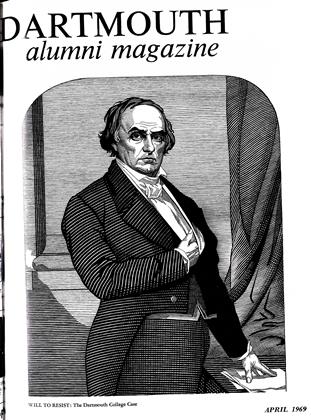THE KINGS DEPART. THE TRAGEDY OF GERMANY: VERSAILLES AND THE GERMAN REVOLUTION.
APRIL 1969 JOHN CLINTON ADAMSTHE KINGS DEPART. THE TRAGEDY OF GERMANY: VERSAILLES AND THE GERMAN REVOLUTION. JOHN CLINTON ADAMS APRIL 1969
ByRichard M. Watt '52. New York: Simonand Schuster, 1968. 604 pp. 22 illustrations and 2 maps. $10.
Richard M. Watt will be remembered as the author of Dare Call It Treason, reviewed in the DARTMOUTH ALUMNI MAGAZINE of March 1963, a gripping account of the mutinies that shook the French army in 1917, the "Year of Agony," as the Great War slowly approached its climax. His new book is a detailed narrative of the immediate aftermath of that war: the peace conference at Paris and the tribulations of defeated Germany during the year following the Armistice of November 11, 1918.
The book begins with the negotiations among the victorious allies at Paris for a peace treaty with Germany. Attention is centered, properly enough, upon the part played by President Woodrow Wilson. The author maintains that Wilson "fell into a series of errors in judgment which would prove disastrous. Prior to the last months of 1918 he had been successful in everything. From' this point on he would be successful in almost nothing."
The scene then shifts to Germany, and about half of the book is devoted to events there. The sailors mutinied at Kiel, the Kaiser was forced to abdicate, and the German republic was proclaimed. The communists, led by Karl Liebknecht and Rosa Luxemburg until they were killed, tried to seize power in Berlin in January and March 1919. Bavaria fell to Kurt Eisner and his eccentric followers, and, after his murder, a communist faction attempted to establish a Soviet Bavaria or at least a Munich commune. This attempt was ruthlessly suppressed by the self-styled "bloodhound" Gustav Noske and his Freikorps.
The last section deals with German reaction to, and acceptance of, the peace treaty. The German delegation sent to Paris to receive the Allies' terms was told by Clemenceau: "The hour has struck for the weighty settlement of our account. ... The volume which the secretary general of the conference will shortly hand to you will tell you the conditions we have fixed. ..." Given fifteen days to study the bulky treaty and submit written observations, the Germans were horrified and enraged by its provisions. The "shame-dictate of Versailles" was to be a standard theme in Adolf Hitler's standard oration. Resistance to the Allies was considered but rejected as impractical, and the treaty was signed on the fifth anniversary of the shots at Sarajevo, June 28, 1919. Twenty years later, having revised the peace settlement as much as possible short of war, Hitler undertook its further revision by attacking Poland.
This is a big book, well-annotated, with bibliography, full index, and photographs. As before, Mr. Watt writes vividly, with a keen and appreciative eye for personalities and events.
Mr. Adams is Professor of History, Dartmouth College.
 View Full Issue
View Full Issue
More From This Issue
-
 Feature
FeatureWILL TO RESIST
April 1969 By RICHARD W. MORIN '24 -
 Feature
FeatureThe New Dean of the College...
April 1969 -
 Feature
FeatureCongress Authorizes National Medal
April 1969 -
 Class Notes
Class Notes1933
April 1969 By ERNEST S. DAVIS JR., WESLEY H. BEATTIE -
 Class Notes
Class Notes1930
April 1969 By CHARLES V. RAYMOND, G. WARREN FRENCH -
 Class Notes
Class Notes1955
April 1969 By JOSEPH D. MATHEWSON, RANDOLPH J. HAYES
JOHN CLINTON ADAMS
Books
-
 Books
BooksTHIDWICK THE BIG HEARTED MOOSE,
November 1948 -
 Books
BooksPROBLEMS IN LABOR RELATIONS
November 1937 By Bruce Knight -
 Books
BooksNORTHWEST TO FORTUNE.
JANUARY 1959 By JOHN HURD '21 -
 Books
BooksVice in Its Gayest Colors
June 1975 By JOHN HURD '21 -
 Books
BooksRight to Life
JUNE 1977 By RONALD M. GREEN -
 Books
BooksNAW SU
April 1948 By VERNELLE W. DYER


